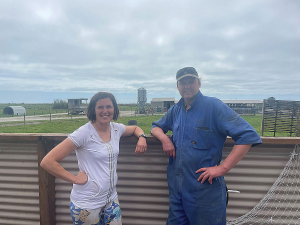It has turned out to be a successful shift for him, his wife Abby, who is a GP, and their young family.
“I think the goal was always to own a farm,” says Clement.
“When you have kids life changes quite quickly and getting away from the large-scale Canterbury systems was our motivation for coming here. Working there was awesome and gave me a lot of experience, but the higher I got the more I was doing day-to-day stuff that I wasn’t enjoying as much.”
Although the Clements knew they would like to own a farm, they weren’t sure how to make their dream a reality. Smaller herd farming on the West Coast turned out to be the solution.
“We looked at a few opportunities, sharemilking, equity partnerships, but I wasn’t 100 percent sure that that was the right thing for me. We had ruled out farm ownership because we didn’t think we had the equity to do it. By chance, we happened upon a Property Brokers seminar; it really opened our eyes to the opportunity on the West Coast. I couldn’t believe the price of land, and they are good farms as well. The only hesitation when we started to look over here was that it was too good to be true. Whatever we were worried about hasn’t come to fruition.”
The Clements are now settled into their third season on their 123ha (eff) self-contained farm, milking 200 Jersey cows in a System 2/3 (they are all grass with a small amount of meal through the shed).
Smaller milk and Supply Herds (SMASH) is going to hold a field day on there on the 28th February to explore Clement’s operation, where he has experimented with a range of flexible milking options, and cover off pasture renewal and surplus calf policies from a West Coast perspective.
“It was never our intention to do flexible milking,” says Clement, “but I realised within the first year that the cows’ production on the West Coast was nothing like what I was used to, so it was a no-brainer. The first year was a baptism by fire.
“We had crappy weather, that was positive from the perspective that it showed us the extremes of the West Coast and our farm; the negative was that it wasn’t so good for production. We were at a level where you couldn’t justify milking the cows twice a day.
“We have tried all the flexible milking regimes. The first year I went 3-in- 2, second year 10-in-7, this year OAD, and we have seen benefits every time. The current system of going TAD to Christmas/ New Year, and then dropping to OAD seems like the winner, but I have to keep in mind that we are having a pretty good season compared to the last two.”
Clement is looking forward to benefitting from Simon Moloney’s expertise at his field day.
Moloney is a highly respected agronomist with 35 years’ experience, including an eleven-year stint designing and maintaining Pāmu’s forage systems nationwide. He is going to talk about pasture renewal strategies for the West Coast.
“I have tried to lift the amount of regrassing that we are doing,” says Clement.
“I am targeting at least 10% but if I can afford it, and the weather and feed situation is right, it would be nicer to be closer to 15%. Historically, the farm has not had a lot of regrassing, some of the pastures are quite outdated. There is also a massive weed burden on the West Coast, and I am keen to lift the clovers. I haven’t had a lot of success yet.
‘‘I have tried a lot of different things but it is just not that simple. It is so different from anywhere else in New Zealand, but even within the West Coast there are microclimates everywhere, in comparison with Canterbury where what you are doing is pretty much the same as someone two or three hours down the road. Here my farm is so different from someone ten minutes up the road – different climate, different soil type; as a result how you farm is quite different. That is the challenge for a lot of things, not just pasture.”
Income from Surplus Calves
Paul Clement is also interested to hear what Bob Thomson from AgFirst has to say about the options for generating an income from surplus calves.
Thomson has led a long career as an agribusiness consultant in the sheep and beef industry. In recent years he has investigated the potential for rearing beef-sired dairy calves, from both a beef and dairy farming perspective. Clement, like most farmers, is still reliant on selling surplus calves as bobbies and can’t see a profitable alternative.
“We rear about 60-70% of our calves,” says Clement. “We are a Jersey herd and there is no money in bobbies for us, so that is a challenge. We are looking at how we can maximise our returns via other avenues. We are rearing as many replacements as we can, that gives us the option to do some intense culling over the next few years.
“We also rear Jersey bull calves, about 60, some for us and the rest go over to Canterbury for breeding. I think there are still opportunities for waste calves, bobbies are more of a disposal method for us, it is quite a costly exercise.”
SMASH is looking forward to returning to the West Coast, where they get an enthusiastic response from the locals, and focusing on strategies particularly suited to its farming systems.
As Clement puts it, “I have been told that farming in Canterbury is a science and farming on the West Coast is an art”.















